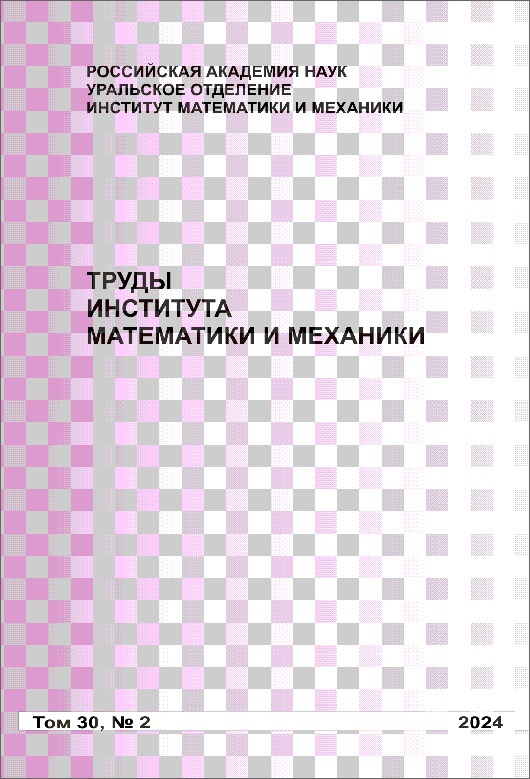|
On the order of decrease of uniform moduli of smoothness for the classes of periodic functions Hlp[ω], l∈N, 1⩽p<∞
N. A. Il'yasov
Baku State University, Baku, Azerbaijan
Abstract:
S. B. Stechkin posed the following problem: for given 1⩽p<q⩽∞, r∈Z+, l,k∈N, and ω∈Ωl(0,π], find the exact order of decrease of the Lq(T)-modulus of smoothness of the kth order ωk(f(r);δ)q on the classes of 2π-periodic functions Hlp[ω]={f∈Lp(T): ωl(f;δ)p⩽ω(δ),δ∈(0,π]}, where T=(−π,π], L∞(T)≡C(T), and Ωl(0,π] is the class of functions ω=ω(δ) defined on (0,π] and satisfying the conditions 0<ω(δ)↓0 (δ↓0) and δ−lω(δ)↓(δ↑). Earlier the author solved this problem in the case 1⩽p<q<∞. In the present paper, we give a solution in the case 1⩽p<q=∞; more exactly, we prove the following theorems.
Theorem 1. Suppose that 1⩽p<∞, f∈Lp(T), r∈Z+, l,k∈N, l>σ=r+1/p, ρ=l−(k+σ), and ∑∞n=1nσ−1ωl(f;π/n)p<∞. Then f is equivalent to some function ψ∈Cr(T)and the following estimate holds:ωk(ψ(r);π/n)∞⩽C1(l,k,r,p){∑∞ν=n+1νσ−1ωl(f;π/ν)p+χ(ρ)n−k∑nν=1νk+σ−1ωl(f;π/ν)p}, n∈N, where χ(t)=0 for t⩽0, χ(t)=1 for t>0, and Cr(T) is the class of functions ψ∈C(T) that have the usual rth-order derivative ψ(r)∈C(T) (we assume that ψ(0)=ψ and C(0)(T)=C(T)).
Note that this estimate covers all possible cases of relations between l and k+r.
Theorem 2. Suppose that 1⩽p<∞, r∈Z+, l,k∈N, l>σ=r+1/p, ρ=l−(k+σ), ω∈Ωl(0,π], and ∑∞n=1nσ−1ω(π/n)<∞. Then sup f\in H_{p}^{l}[\omega]\}\asymp\sum_{\nu=n+1}^{\infty}\nu^{\sigma-1}\omega(\pi/\nu)+\chi(\rho)n^{-k} \times \sum_{\nu=1}^{n}\nu^{k+\sigma-1}\omega(\pi/\nu), n\in\mathbb N, where \psi denotes the corresponding function from C^{r}(\mathbb T) equivalent to f\in H_{p}^{l}[\omega].
In Theorems 1 and 2, the case l=k+\sigma=k+r+1/p (\Rightarrow \chi(\rho)=0) is of the most interest. This case is possible only for p=1, since r\in\mathbb Z_{+} and l,k\in\mathbb N. In this case, the proof of the estimate in Theorem 1 employs the inequality n^{-l}\|T_{n,1}^{(l)}(f;\cdot)\|_{\infty} \le C_{2}(l)n\omega_{l+1}(f;\pi/n)_{1}, where T_{n,1}(f;\cdot) is a best approximation polynomial for the function f\in L_{1}(\mathbb T). The latter inequality is derived from the strengthened version of the inequality of different metrics for derivatives of arbitrary trigonometric polynomials \|t_{n}^{(l)}(\cdot)\|_{\infty}\le 2^{-1}\pi\|t_{n}^{(l+1)}(\cdot)\|_{1}, n\in\mathbb N.
Keywords:
modulus of smoothness, best approximation, inequality between moduli of smoothness of different orders in different metrics, exact order of decrease for uniform moduli of smoothness on a class.
Received: 10.08.2017
Citation:
N. A. Il'yasov, “On the order of decrease of uniform moduli of smoothness for the classes of periodic functions H_{p}^{l}[\omega],\ l\in \mathbb N,\ 1\le p < \infty”, Trudy Inst. Mat. i Mekh. UrO RAN, 23, no. 4, 2017, 162–175
Linking options:
https://www.mathnet.ru/eng/timm1476 https://www.mathnet.ru/eng/timm/v23/i4/p162
|

| Statistics & downloads: |
| Abstract page: | 441 | | Full-text PDF : | 161 | | References: | 97 | | First page: | 18 |
|




 Contact us:
Contact us: Terms of Use
Terms of Use
 Registration to the website
Registration to the website Logotypes
Logotypes









 Citation in format
Citation in format 